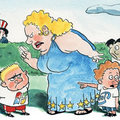The Caribbean region comes under scrutiny
In the wake of the arrests on June 2nd of several Caribbean nationals in an alleged plot to attack John F Kennedy airport in New York, questions are swirling over the threat of terrorist cells sprouting up across the region and its potential use as a base to launch attacks against the US. Until now there has been no evidence that this is the case, but attention to the Caribbean, the movement of its nationals and its countries’ security arrangements will now surely be ratcheted up.
Although the region has very little history of Islamic militancy, US officials claim the area has been of growing concern. Security analysts publicly argue that it could become an attractive base for terrorist groups because of its geographical proximity to the US, its relatively permeable borders and its high poverty levels. Moreover, drug trafficking and crime are rampant in several Caribbean countries, suggesting that local governments have little institutional capacity to control the activities of criminal networks.
According to US authorities, the four suspects in the alleged terror plot had links to Jamaat al Muslimeen, a Muslim organisation based in Trinidad and Tobago with a predominantly Afro-Trinidadian membership. Three of the men are Guyanese nationals, while the fourth is Trinidadian. One of the men, a naturalised US citizen, was once a cargo handler at Kennedy Airport. Another was a former member of the Guyanese parliament. All four are said to hold Islamist beliefs “of a violent nature”, according to an FBI representative.
While the men are reported to have sought out Jamaat's leadership for "operational expertise, means and, most importantly, their blessing," no concrete indication has yet emerged that the men were acting on the group's instructions.
Jamaat al Muslimeen, or "Society of Muslims," is a group that is well known in the twin-island republic. It was the group’s controversial leader, Imam Yasin Abu Bakr, who led an attempted coup against Trinidad's elected government in July 1990, holding members of the government (including the then-prime minister, ANR Robinson, and the cabinet) hostage for six days at gun-point while looting and violence shook Port of Spain and left 24 people dead.
The crisis ended when Jamaat's leadership surrendered in exchange for immunity from prosecution, a deal later honoured by Trinidad's judicial system. Mr Abu Bakr and 114 followers initially were offered a presidential pardon. Although the offer was subsequently retracted, after putting the men on trial the courts ruled that the pardon should be upheld and the coup participants were freed.
The decision to free Mr Abu Bakr was highly controversial and had a long-lasting impact on Trinidadian society, as it suggested that even those who would dare to violently hijack the government would be exempted from prosecution. The group has had several run-ins with the law since 1990. Although Jamaat was linked to a series of bombings in Port of Spain in 2005, it denied any involvement. That same year a member of Jamaat was convicted in the US for attempting to ship 70 assault rifles from Fort Lauderdale to Trinidad.
In 2006, Mr Abu Bakr was acquitted of charges of the attempted murders of two former Jamaat members–a botched plot in which a woman with no ties to the organisation was killed. In the first case brought under Trinidad's new Anti-Terrorism Act, Mr Abu Bakr is now facing sedition and terrorism charges for a threatening sermon in which he vowed to declare war on wealthy Muslims unless they increased their contributions to charity. The state is also attempting to seize land with a value of TT$32m (US$5m) from Mr Abu Bakr and his associates, to compensate for damage to government property during the attempted coup in 1990.
Yet Jamaat al Muslimeen is a small group, consisting of only several hundred members, and it represents only a tiny fraction of Trinidad's Muslim population. Importantly, there is no precedence of Jamaat acting outside of Trinidad, which makes the recent links with the terror plot at JFK all the more perplexing if substantiated. It is also a Sunni-based Muslim group. By contrast, according to Trinidadian newspapers, two of the men arrested, Kareem Ibrahim and Abdul Kadir, were imams of Shia mosques in Trinidad and Guyana, respectively.
Nevertheless, the arrests and the subsequent trials will surely focus more international attention on Trinidad and Tobago and the radical Muslim movement that calls it home. Guyana and its nationals will also be subject to greater scrutiny.
Further, the US now can be expected to more intensely monitor the entire Caribbean region’s security arrangements. In the past, efforts to strengthen the Caribbean’s security systems have been directed at pursuing drug traffickers and their money, and in some cases, such as Haiti, impeding an outflow of illegal aliens. Despite its advocacy of a "third border" concept—which views the Caribbean as another border area besides Mexico and Canada, requiring special treatment—the US had until now paid little policy attention to the area as an integral part of its fight against global terrorism.
That has now changed. At the same time, however, there is as yet no substantial reason to believe that the Caribbean will soon become a major terrorist hub.





